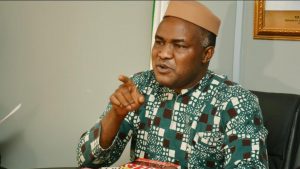The Human Rights Writers Association of Nigeria, HURIWA, has berated President Muhammadu Buhari over his administration’s delay in prosecuting armed Fulani herdsmen who have killed several farmers in Nigeria.
HURIWA lamented that armed herdsmen have killed over 6, 000 rural farmers across the country.
According to a statement made available to the media by its National Coordinator, Emmanuel Onwubiko, HURIWA said the perception was because the majority of the armed Fulani killers belong to Buhari’s ethno-religious affiliation.
Read Also June 12 will haunt my father for the rest of his life, says IBB’s son
The statement reads: “Since coming on board for the second time as head of state but as an elected leader of Nigeria for the first time in the year 2015, president Muhammadu Buhari is yet to bring to justice suspected armed Fulani attackers responsible for killings of over six thousand rural farmers all across Nigeria.

“As the military leader in the mid-eighties, the then major general Muhammadu Buhari garnered some high reputation as a no-nonsense disciplinarian seen as a patriotic Nigerian with a high propensity of nationalistic desires to drive in sense into the minds of a lot of Nigerians then who exhibited scarce respect for the rule of law.
“However, since he was sworn in as elected president in 2015 and he has already served out his first term and has just been returned elected and sworn in around May 2019 for the last constitutional term, the president is yet to ensure that suspected killers made up of armed Fulani herdsmen are arrested, prosecuted before competent courts of law and punished for these grave crime against humanity.
“There are groundswells of perception that because the majority of these suspected armed Fulani killers of rural farmers belong to his ethno-religious affiliation, his government is not in any hurry to do the needful.
“Already, President Buhari has spent over 100 days after his second and final swearing-in during which he held on to both the Holy Book of his faith and the supreme law of Nigeria known as the constitution of the Federal Republic Of Nigeria of 1999, and swore under a binding oath to do right to all manner of people according to law, without fear, or favour, affection or ill-will, but the government has failed to bring justice to thousands of victims of the numerous cases of killings carried out all around Nigeria by suspected armed Fulani herdsmen.
Read Also Gowon turns 85: Tinubu, Bamanga Tukur, others pass encomium on former military ruler
“Both the offices of Inspector General of Police and the Attorney General of the Federation have failed in their constitutional obligations to bring the culprits to book.
“I have taken a great deal of time to compile few records of these attacks by suspected armed Fulani herdsmen since 2016 to 2018. Just as I have opted to establish legally that it is obligatory on the president to ensure that the law is not a respecter of any killer.
“This is why the State has two tasks in which potential victims of wrongdoing are likely to take an interest; first is to criminalize certain behaviors which wrong others, the second is to punish those behaviors. It fulfills only one part of the law when all a society has is provision in a piece of document without complementary enforcement of those provisions in defaulters or deviants.
“The first legal basis and rationale for the punishment of those crimes is that the law has provided for their punishment. It must be reiterated that the usual procedure for law passage involves the executive and legislative arm of governments, so much so that even in military regimes, quasi legislative assembly or committees are constituted to serve as the parliament to either formulate the set of rules that eventually decreed or in the least the embellish it with the legislative or legal jargons. The point is that at the violation of a law, the organ of government with powers to adjudicate is the judiciary.
“Another basis for which the crime of kidnapping and arm banditry must be punished is that they are not compoundable offences. A crime is compoundable when the victim of an offence which is personal to him accepts a settlement from the perpetrator in lieu of prosecution. However, the offences of kidnapping or abduction and armed banditry are not personal to any particular victim. The whole society is a victim of kidnapping and armed banditry.
They are offences which deal with the state of safety of the public and for which any member of the society could be a victim either by virtue of social standing in financial terms, or by virtue of mere membership of a particular tribe or group or merely by being a believer or practitioner of a particular faith or religion. Again the manner of carrying out of these offences involves the use of firearms which only the State has prerogative over.
“Moreover, it is someway compounding of offence to fail to prosecute and punish kidnappers and arm bandits. In the case of PML (NIG) LTD v. FRN (2017) LPELR – 43480 (SC), 39-44, Paras. B-C the Supreme Court shed light on the concepts of compounding of offence and compounding offence in the following words:
“Compounding a crime” is defined in the same Black’s Law Dictionary, 9th Ed., as follows
“The offense of either agreeing not to prosecute a crime that one knows has been committed or agreeing to hamper the prosecution.
”Compounding a crime is also “a criminal act in which a person agrees not to report the occurrence of a crime or not to prosecute a criminal offender in exchange for money or other consideration.”



![[PRESS RELEASE] Whip Music Joins United Nation’s eTrade for Women Initiative To Empower Africa’s Creative Sector](https://newsheadline247.com/wp-content/uploads/2025/11/whip-218x150.jpg)











